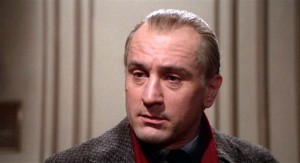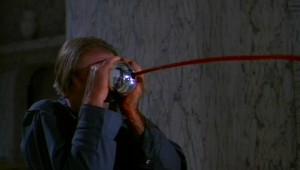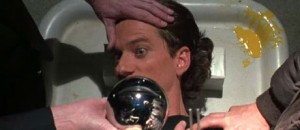Once Upon A Time in America vs. Phantasm IV: Oblivion
Those who haven’t seen either Phantasm IV: Oblivion or Once Upon a Time in America may be lost reading the content below. They also may be annoyed that the ending(s) and plot points are ruined for them. But I doubt it.

There are many who believe that the ending of Once Upon a Time in America implies that the entire film has been an opium induced fever dream that is being had by Robert De Niro’s Noodles character. Whether you buy into this is obviously open to your own interpretation. To me, the movie is sort of an unfocused 4 hour film, where the hierarchy of the mob is never really worked out, so we don’t know exactly who is causing the characters to constantly fear for their life. Women are treated appallingly throughout, and Elizabeth McGovern seems to forgive De Niro for an absolutely brutal rape, just because a significant amount of time has passed. The sequences that involve the children are much better than the adult scenes, but don’t effectively set up anything for later, they’re put in there so the movie can be labeled an “epic.”
 Recently, I watched Phantasm IV: Oblivion, which is oddly similar to Once Upon a Time in America many ways, mostly because it also resembles a fever dream. Phantasm IV is clearly a cash in, comprised about half with flashbacks from previous Phantasm movies, and its reason for being was the use of deleted scenes from the first film which weren’t good enough to be included on the massive LD and DVD set. Rarely will you see a movie that is more padded with scenes that go absolutely nowhere, Reggie Bannister is in another movie altogether for quite some time, he picks up a woman whose car flips over when he’s driving alongside her. Within 10 minutes of screen time, she’s dead, with the mysterious silver balls of The Tall Man coming out of her breasts. There is a pretense of explaining the origin of The Tall Man, but the movie never gets farther than showing Angus Scrimm as a gentle old man and scientist before he turned evil. Scenes are assembled randomly and most of the time we are in the mind of Mike, who The Tall Man wants for some reason. Mike was implanted with one of the silver balls at the end of Phantasm III, and has been suffering from constant daydreams and nightmares (which is how writer/director Don Coscarelli finds a way to work in all of those flashbacks), and he keeps seeing his dead brother who is either evil or not so, the purpose of his presence is never made clear. Most of the dialogue in Phantasm IV is ADR’d in, rarely do you see anyone visibly speaking their dialogue. Anything that is said is either really vague or a cliché, or both. So the movie allows you to focus on Mike’s dreams, as he goes in and out of consciousness, and the randomness of the powers of The Tall Man, and the pseudo creepy imagery it attempts to scare us with and a constant use of slow motion shots of The Tall Man walking in Death Valley or in an unnamed vacated city.
Recently, I watched Phantasm IV: Oblivion, which is oddly similar to Once Upon a Time in America many ways, mostly because it also resembles a fever dream. Phantasm IV is clearly a cash in, comprised about half with flashbacks from previous Phantasm movies, and its reason for being was the use of deleted scenes from the first film which weren’t good enough to be included on the massive LD and DVD set. Rarely will you see a movie that is more padded with scenes that go absolutely nowhere, Reggie Bannister is in another movie altogether for quite some time, he picks up a woman whose car flips over when he’s driving alongside her. Within 10 minutes of screen time, she’s dead, with the mysterious silver balls of The Tall Man coming out of her breasts. There is a pretense of explaining the origin of The Tall Man, but the movie never gets farther than showing Angus Scrimm as a gentle old man and scientist before he turned evil. Scenes are assembled randomly and most of the time we are in the mind of Mike, who The Tall Man wants for some reason. Mike was implanted with one of the silver balls at the end of Phantasm III, and has been suffering from constant daydreams and nightmares (which is how writer/director Don Coscarelli finds a way to work in all of those flashbacks), and he keeps seeing his dead brother who is either evil or not so, the purpose of his presence is never made clear. Most of the dialogue in Phantasm IV is ADR’d in, rarely do you see anyone visibly speaking their dialogue. Anything that is said is either really vague or a cliché, or both. So the movie allows you to focus on Mike’s dreams, as he goes in and out of consciousness, and the randomness of the powers of The Tall Man, and the pseudo creepy imagery it attempts to scare us with and a constant use of slow motion shots of The Tall Man walking in Death Valley or in an unnamed vacated city.
The Phantasm series is not about coherency, the previous 3 movies had a weird energy that eschewed the fact that at no point did it make any sense nor follow its own rules (or really bother to establish them either). Criticizing the fourth movie for being absolutely awful seems pointless, but it is ineffective at replicating the dreamy unreality that flows through the other three films. However, as an idea, where a character’s actions have no effect on what happens to them, and they are constantly hallucinating (might The Tall Man not even really exist?), it has sort of a strange power. It reminded me of the highly superior Brain Damage in that way; perhaps Mike is using the ball in his head as a drug of sorts, much like Alymer.
 Once Upon a Time In America and Phantasm IV: Oblivion are the types of movies which ask you what type of film you prefer. Do you like a movie that plays it straight forward for 98% of its (long, in the case of OUATIA) running time and then throws in a twist at the end which may or may not make you rethink what has gone on before it? Does that make you feel a little cheated, as if you’ve wasted your time? Or do you prefer a nonsensical hallucination for the entire 90 minute running time, with constant bizarre imagery, but with little in the way of consistency in characters or the willingness to follow its own rules (Eraserhead, In the Mouth of Madness)?
Once Upon a Time In America and Phantasm IV: Oblivion are the types of movies which ask you what type of film you prefer. Do you like a movie that plays it straight forward for 98% of its (long, in the case of OUATIA) running time and then throws in a twist at the end which may or may not make you rethink what has gone on before it? Does that make you feel a little cheated, as if you’ve wasted your time? Or do you prefer a nonsensical hallucination for the entire 90 minute running time, with constant bizarre imagery, but with little in the way of consistency in characters or the willingness to follow its own rules (Eraserhead, In the Mouth of Madness)?
I think we all know the answer. Anyone who doesn’t believe that Phantasm IV is the superior film is obviously a luddite.




Phantasm IV: Oblivion (1998) | All Films Blog says:
July 2nd, 2011
1:03 pm
[…] regrettablesincerity.com […]